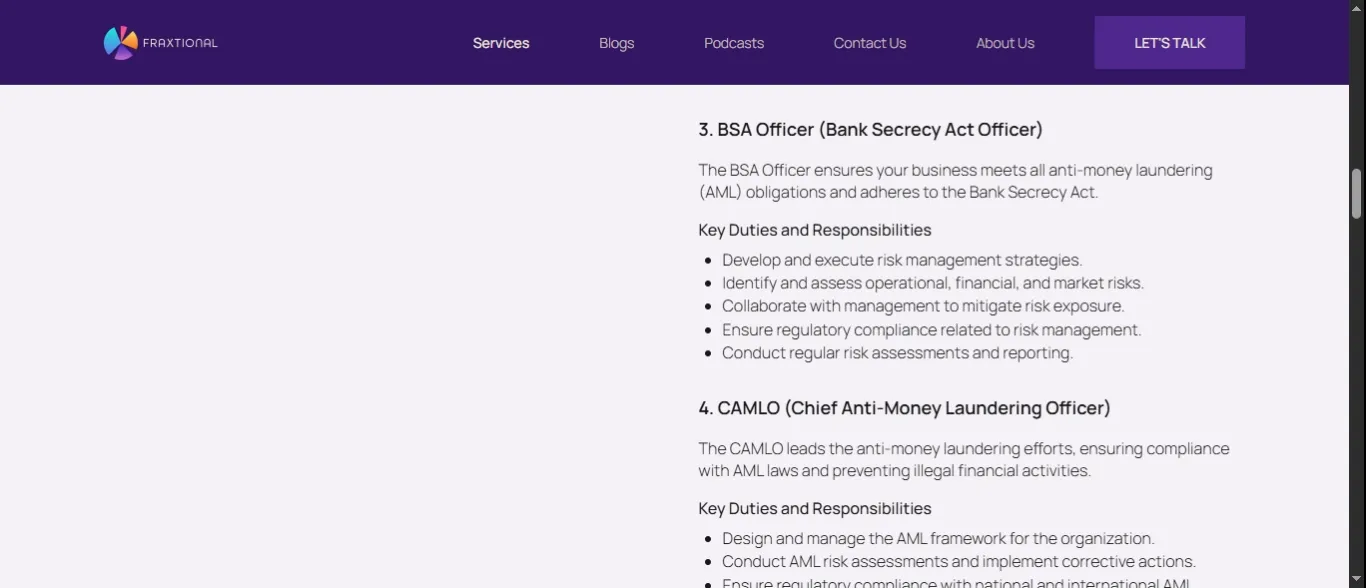Jul 28, 2025
What is a BSA Officer & Why is It Crucial for Fintech and Crypto?

By Fraxtional LLC

Instant payments, digital wallets, and crypto exchanges have made financial transactions faster than ever. But with that speed comes greater risk. Just look at the recent case where OKX, a major crypto exchange, agreed to a $505 million penalty for failing to meet AML requirements. We understand how overwhelming it can be for fintech and crypto startups to navigate the fast-paced world of digital transactions while trying to keep up with ever-evolving compliance demands and regulatory scrutiny.
Incidents like this aren’t isolated; they serve as a wake-up call for the entire fintech and cryptocurrency industry. That’s why every company in this space needs someone dedicated to managing risk and staying ahead of compliance issues. And that’s exactly the role of a BSA Officer.
A BSA Officer is responsible for enforcing the Bank Secrecy Act, preventing financial crimes, and ensuring your company stays on the right side of the law. This is not just a regulatory formality; it’s a strategic role. Without a strong BSA Officer, your business is exposed to fines, audits, and reputational damage.
This blog will explain exactly what a BSA Officer is and why this role is critical to your success. You'll learn how they manage audits, assess risk, monitor compliance, and help build a strong BSA/AML program tailored to your startup’s needs.
TL; DR
- A BSA Officer ensures your fintech or crypto startup follows AML, KYC, and BSA laws.
- Identifies, assesses, and mitigates financial crime risks through ongoing reviews and controls.
- Uses automated tools to flag suspicious behavior and detect fraud in real time.
- Educates staff on compliance responsibilities, red flags, and escalation protocols.
- Prepares documentation and systems to handle regulatory audits and examinations smoothly.
What Is a BSA Officer?

A BSA Officer (Bank Secrecy Act Officer) is responsible for making sure a financial institution complies with the Bank Secrecy Act. This law helps detect and prevent money laundering, terrorist financing, and other financial crimes. It involves setting up the right policies, overseeing internal processes, and ensuring that all required reports are filed properly.
For FinTech and crypto startups, the BSA Officer’s job becomes even more critical. These businesses deal with fast-moving digital transactions and often operate across borders, making compliance more complex. That’s why many early-stage founders turn to platforms like Fraxtional to access fractional BSA Officers who know the space, the laws, and the pressure points.
Why Your FinTech or Crypto Startup Needs a BSA Officer?

As a FinTech or crypto startup, you’re innovating in one of the most effective industries, but with that innovation comes the serious responsibility of staying compliant.
One of the most important regulatory frameworks you need to be familiar with is the Bank Secrecy Act (BSA). This law helps prevent money laundering, terrorist financing, and other financial crimes, and it’s especially relevant for companies handling digital transactions.
In such an effective environment, having someone who can navigate regulatory complexity becomes a core part of your operation. That’s why having a dedicated BSA Officer is so important for FinTech and crypto startups.
A dedicated BSA Officer isn’t just a regulatory box to check; it’s a strategic asset. Here’s why:
- Regulatory Compliance First: Helps stay compliant with complex regulations like AML, KYC, and SARs, especially vital for FinTech and crypto startups navigating digital and cross-border transactions.
- Fraud Risk Protection: Safeguard your business with strong AML controls and processes that detect and prevent financial crime, from fraud to money laundering.
- Credibility and Trust: Signal to customers, investors, and regulators that you’re serious about data security and responsible innovation.
- Proactive Risk Management: Avoid costly setbacks with ongoing assessments, internal controls, and early identification of compliance gaps.
- Adapting to Change: Keep pace with shifting regulations, including those around stablecoins and digital assets, without stalling growth.
- Audit-Ready Always: Maintain organized records and compliant systems so you’re prepared for audits and regulatory inspections at any time.
- Empowered Team Culture: Train employees to recognize red flags and follow compliance protocols, making compliance a company-wide effort.
Once you recognize the importance of a BSA Officer, it naturally leads to a closer examination of what they do on a day-to-day basis.
Also Read: Internal Audit Checklist for Effective Financial Assessment & Control
Key Roles & Responsibilities of a BSA Officer

The role of a BSA Officer is multifaceted. It involves a wide range of duties and responsibilities that ensure the company adheres to regulations and mitigates the risk of illicit financial activities. Below are the key roles and responsibilities of a BSA Officer:
Building and Managing the BSA Compliance Program
The BSA Officer is responsible for designing and maintaining your company’s compliance framework. This includes setting up policies for AML, KYC, and SAR (Suspicious Activity Report) filing, and making sure these policies evolve as regulations change.
Monitoring for and Reporting Suspicious Activity
Using internal systems and tools, the BSA Officer ensures that unusual or potentially illicit transactions are identified, reviewed, and reported to authorities like FinCEN. This process is key in helping law enforcement track and prevent financial crimes.
Overseeing KYC and Customer Due Diligence
Customer verification is critical in preventing fraud and money laundering. The BSA Officer ensures that all customers, especially those with high-risk profiles, are properly vetted through KYC procedures and ongoing due diligence.
Conducting Risk Assessments
Regular risk assessments help pinpoint vulnerabilities in your business, like exposure to high-risk geographies, crypto transactions, or rapid growth in user activity. The BSA Officer leads these evaluations and recommends controls to minimize risks.
Training and Educating Your Team
A BSA program is only as strong as the people behind it. The BSA Officer is responsible for training your employees on compliance protocols, red flags to watch for, and how to report suspicious activity.
Implementing Internal Controls and Managing Audits
To stay audit-ready, the BSA Officer ensures that internal controls are in place and functioning properly. They manage documentation, coordinate with internal auditors, and support examinations from regulatory agencies, so you’re never caught off guard.
Liaising with Regulators
The BSA Officer is your primary point of contact for regulators. Whether it's FinCEN, OFAC, or state authorities, they handle correspondence, manage inquiries, and ensure your startup is aligned with evolving regulatory expectations.
Ensuring OFAC Sanctions Compliance
Your BSA Officer implements screening systems and regularly updates sanctions lists to ensure no transactions are made with restricted entities or individuals, thereby maintaining OFAC compliance. This helps avoid serious legal and reputational fallout.
Driving Continuous Improvement
Financial crime tactics evolve, and so should your compliance program. A good BSA Officer constantly evaluates and updates systems, tools, and policies to stay ahead of risks and regulatory updates.
Managing Cross-Border Compliance
If your company handles cross-border payments or crypto transactions, the BSA Officer ensures you comply with international AML and KYC regulations. They help you navigate the added complexity of operating across multiple jurisdictions.
Effective leadership ensures coordination across teams, timely policy updates, and enforcement of compliance measures to manage internal compliance successfully. That’s why FinTech and crypto founders often work with Fraxtional to bring in experienced BSA Officers who can set up and manage AML programs, monitoring systems, and cross-functional training from day one.
Operating across borders adds more than just regulatory layers; it demands constant coordination. That’s where the BSA Officer plays a critical role, acting as the bridge between your company, internal stakeholders, and external regulators.
Also Read: Understanding Regulatory Risk and Compliance Management
How Does a BSA Officer Coordinate with Regulators and Internal Teams

The role of a BSA Officer isn’t just about writing policies or monitoring transactions; they’re also the bridge between your startup and the regulatory world. For FinTech and crypto companies, staying aligned with regulators while keeping internal teams informed and on track is critical to long-term success.
Here’s how a BSA Officer keeps everything (and everyone) working together:
Coordinating with Regulators
A core responsibility of the BSA Officer is to manage all interactions with regulatory bodies. This role demands proactive communication, timely reporting, and a deep understanding of evolving compliance requirements. They handle this critical function by:
- Serving as the Regulatory Liaison: The BSA Officer is the main point of contact for FinCEN, the U.S. Department of the Treasury, and state or international agencies. They oversee filings such as SARs and CTRs, ensuring compliance with OFAC sanctions.
- Handling Inquiries and Examinations: When regulators request information, the BSA Officer gathers documents, coordinates team input, and manages communication. This is especially vital during audits and formal examinations.
- Tracking Regulatory Changes: The BSA Officer stays informed through briefings and legal updates. They ensure internal policies and practices are always aligned with current requirements.
- Maintaining Strong Regulator Relationships: Building trust with regulators can significantly impact the outcome of reviews or investigations. The BSA Officer encourages open communication to demonstrate the company’s commitment to compliance.
Collaborating with Internal Teams
Compliance isn’t just about meeting external rules; it’s also about aligning internal teams around shared responsibilities. The BSA Officer plays a central role in bridging departments to build a strong, proactive compliance culture. They work cross-functionally by:
- Advising Senior Leadership: The BSA Officer keeps senior management informed about regulatory risks, compliance metrics, and strategic implications. Their input is especially valuable when entering new markets or launching products.
- Working with Legal: The BSA Officer collaborates with legal teams to interpret new laws, review contracts, and ensure reports like SARs meet legal standards.
- Teaming Up with Compliance & Risk Units: The BSA Officer partners with risk and compliance teams to run assessments, update policies, and enforce standards across departments.
- Training Employees: The BSA Officer ensures that employees are properly prepared. They design training programs, often with HR, to teach teams how to detect red flags and handle sensitive data responsibly.
- Partnering with IT & Security: The BSA Officer ensures IT systems support secure data storage, reliable monitoring, and regulatory reporting requirements.
When regulators come knocking, it’s the BSA Officer who leads the charge. They manage audits and examinations to ensure your company is prepared and protected.
Also Read: Understanding Audit Procedures and Controls
What’s Involved in Managing Regulatory Audits and Examinations?

As your FinTech or crypto startup grows, managing regulatory audits and examinations becomes essential to maintaining compliance. Regulatory bodies like FinCEN, the SEC, and state agencies routinely evaluate businesses to ensure adherence to laws aimed at preventing money laundering, fraud, and financial crimes.
A strong BSA Officer prepares you to handle them proactively, something Fraxtional CCOs and BSA Officers do regularly for startups working with sponsor banks, exchanges, and regulators.
Here’s how a BSA officer prepares for and navigates these audits effectively:
Prepare Thoroughly for Audits
Audits require clear documentation and readiness across systems and teams. The BSA Officer should lead preparations by organizing key compliance documents, conducting internal audits, and coordinating with relevant departments before regulatory audits. They should:
- Identify Audit Scope: Understand whether the focus is on AML, KYC, monitoring systems, or data security.
- Organize Key Documents: Ensure AML/KYC policies, SARs, monitoring reports, and training logs are current and accessible.
- Conduct a Self-Assessment: Identify and address compliance gaps early.
Engage Effectively with Regulators
Clear, prompt communication with regulators sets the tone for a smooth audit. The BSA Officer acts as the central point of contact throughout. They should:
- Be Transparent and Timely: Respond to queries accurately with supporting documentation ready.
- Coordinate Internally: Work cross-functionally with legal, IT, and operations to provide requested data and clarify processes.
Respond to Findings and Correct Issues
When issues arise, regulators want to see action, not excuses. Quick, organized responses can reduce penalties. A BSA officer should:
- Remediate Promptly: Define actions, assign accountability, and set deadlines.
- Report Back Clearly: Share evidence of resolution and updated controls.
- Mitigate Impact: Proactive steps can reduce regulatory consequences.
Conduct a Post-Audit Review
Every audit offers a chance to improve. A brief internal review helps strengthen future compliance efforts. A BSA officer should analyze gaps and processes, identify what worked and what didn’t. Also, they should refine controls and training based on findings.
Stay Audit-Ready with Proactive Compliance
The best audit defense is a strong, ongoing compliance program. Continuous improvement involves regularly updating compliance policies, refining monitoring systems, and conducting employee training to reduce risk and build regulator trust. A BSA officer should regularly test AML/KYC procedures. They should keep staff informed on red flags and data handling. Additionally, utilize monitoring tools to identify suspicious activity promptly.
Also Read: Effective AML Risk Assessment Process Guide
How Does a BSA Officer Conduct Risk Assessments and Monitor Transactions
A BSA Officer plays a crucial role in the compliance ecosystem by proactively identifying financial crime risks and ensuring that suspicious transactions are detected and reported.
Below is a detailed look at how BSA Officers conduct risk assessments and transaction monitoring to safeguard the organization and maintain regulatory compliance.
1. Conducting Risk Assessments
Risk assessments involve analyzing transaction data, customer profiles, and geographic factors to identify vulnerabilities to money laundering and terrorist financing. For FinTech and crypto startups, risk often stems from high-speed transactions, emerging products, and global customer bases.
The BSA officer follows these steps for risk assessments:
- Pinpoint High-Risk Areas: Focus on zones like high-volume or anonymous transactions, cross-border payments, crypto wallets, and customers from sanctioned jurisdictions or PEPs.
- Assess Customer Risk: Use KYC data, transaction history, and geography to flag indicators like incomplete verification or sudden behavioral changes.
- Review Product Risks: Evaluate offerings like stablecoins, DeFi tools, or P2P wallets that may invite misuse.
- Rank and Prioritize: Categorize risks as low, medium, or high to allocate resources and apply enhanced due diligence (EDD) where needed.
- Keep the Profile Updated: Reassess regularly, especially after regulatory shifts, product launches, or major user behavior changes.
2. Monitoring Transactions
Transaction monitoring detects suspicious activity in real-time and is essential for early risk detection in fast-moving FinTech environments. The BSA officer follows these steps for monitoring transactions:
- Use Automated Monitoring Systems: Deploy AI-driven tools to flag activity like large transfers, structuring, use of privacy coins, or movement involving high-risk regions.
- Analyze Behavioral Patterns: Watch for unusual changes, like dormant accounts becoming active or repetitive round-number transfers.
- Spot Red Flags: Look for mismatches between customer profiles and activity, layered transactions, or sudden transaction spikes post-launch.
- Investigate and Escalate: Flagged activity triggers KYC checks, behavioral reviews, and, if needed, filing of Suspicious Activity Reports (SARs) with FinCEN.
- Continuously Tune Systems: Update thresholds and rules to match evolving laundering techniques, regulatory expectations, and crypto typologies.
3. Cross-Team Coordination
Risk management isn’t siloed; it relies on coordination across departments to function effectively. The BSA officer follows them for cross-team coordination:
- Legal: Ensures regulatory alignment and supports SAR filings.
- Operations: Maintains audit readiness and monitors process compliance.
- Customer Support: Helps gather missing documents or clarify user activity
- Engineering/IT: Ensures systems log transactions accurately and supports seamless monitoring integration.
By embedding compliance into day-to-day functions, the BSA Officer encourages a company-wide risk-aware culture.
However, finding the right BSA Officer can make all the difference in how well your FinTech or crypto business stays compliant and resilient.
Also Read: Understanding Risk and Compliance Management Strategies
Choosing the Right BSA Officer for Your FinTech or Crypto Business

In the FinTech and crypto space, the Bank Secrecy Act (BSA) Officer is more than a compliance lead. They are a strategic partner who protects your business, enables growth, and builds trust with regulators and partners. That’s why many high-growth startups turn to Fraxtional.
Hiring the right person for this role is a critical step in building a resilient, audit-ready compliance framework. Here's what to look for:
- Financial Crime Expertise: Hands-on AML/KYC experience in FinTech or crypto, including transaction monitoring, high-risk profiles, and cross-border compliance.
- Regulatory Knowledge: Strong understanding of FinCEN, OFAC, FATF, GDPR, MiCA, and the Travel Rule, with practical application across markets.
- Program Development: Ability to design and scale BSA/AML programs, including KYC policies, transaction monitoring, SAR workflows, and recordkeeping.
- Certified & Current: Holds certifications like CAMS, CFCS, CRCM, or CCCS, reflecting deep compliance knowledge and ongoing learning.
- Cross-Functional Communication: Skilled in reporting, team training, regulatory interactions, and simplifying compliance across departments.
- Analytical Mindset: Proficient in data analysis, transaction reviews, and identifying financial crime patterns and risk trends.
- Leadership & Culture Fit: Balances compliance with growth, adapts to change, and embeds risk management into business decisions.
Selecting the right BSA Officer is crucial. But, it’s equally important to understand the regulatory landscape they’ll be navigating, especially in the U.S.
Also Read: Understanding AML Compliance and Its Importance
Why BSA Compliance Matters, Especially in the U.S.?
Staying compliant with the Bank Secrecy Act (BSA) isn’t optional; it’s a business-critical function. The BSA, also known as the Anti-Money Laundering (AML) Act of 1970, was enacted to combat financial crimes, including money laundering, terrorist financing, and fraud.
For FinTech startups and crypto platforms, BSA compliance not only helps meet regulatory expectations; it also builds trust, prevents costly penalties, and protects your company’s long-term growth.
BSA compliance is so important, particularly in the U.S. market, because it helps:
- Prevent Financial Crimes: BSA compliance helps detect and prevent money laundering, terrorism financing, and market abuse—safeguarding the financial system and supporting global economic stability.
- Fulfill Legal Obligations: Compliance with KYC, SAR, and CTR requirements is mandatory under U.S. law, helping businesses avoid regulatory action and maintain their license to operate.
- Avoid Penalties and Legal Exposure: Non-compliance can lead to heavy fines, criminal charges, license revocation, or lawsuits, costs that far outweigh proactive compliance investment.
- Build Stakeholder Trust: A strong compliance program signals credibility to regulators, attracts investors, and reassures customers that your platform is safe and secure.
- Protect Brand Reputation: Regulatory failures can lead to media fallout, severed partnerships, and user loss, while strong compliance enhances your brand’s appeal and resilience.
- Stay Ahead of Regulatory Change: With evolving crypto, DeFi, and global AML standards, an agile BSA/AML program positions your business to stay compliant and competitive as regulations shift.
How Fraxtional Helps You Navigate BSA Compliance with Confidence?
For FinTech and crypto startups, meeting Bank Secrecy Act (BSA) and AML requirements can feel overwhelming, especially when timelines are tight and expectations are high. That’s where Fraxtional comes in.

Our BSA Officers bring both regulatory expertise and real-world experience to help you:
- Design and manage a risk-based BSA/AML program that fits your business
- Monitor transactions in real time to catch red flags early
- Get audit- and exam-ready with the right controls and documentation
- File timely Suspicious Activity Reports (SARs) and strengthen internal reporting
- Meet sponsor bank and licensing requirements while keeping your growth on track
With Fraxtional, you get high-level BSA support without the cost or delay of hiring in-house. We plug into your team quickly, help you stay compliant, and build the trust you need with banks, regulators, and investors.
Conclusion
If you're building or scaling a FinTech or crypto startup, the right BSA Officer isn’t just a nice-to-have; it’s a must. A strong BSA Officer brings structure, credibility, and protection to your business in a heavily regulated industry. That’s exactly where Fraxtional steps in.
We connect early-stage FinTech and crypto startups with experienced BSA Officers who know your industry, understand your growth path, and stay ahead of regulatory shifts. With Fraxtional, you get top-tier compliance leadership without the full-time burden, so you can focus on what matters most: building, scaling, and staying ahead of the curve.
Explore how Fraxtional can help you transform your compliance and audit processes, making risk management smarter, faster, and more reliable.
FAQs
A BSA Officer typically has experience in compliance or financial crime prevention, with knowledge of AML laws and tools like transaction monitoring systems. Certifications like CAMS (Certified Anti-Money Laundering Specialist) add credibility.
Yes, U.S. regulations require all financial institutions, including FinTech's and crypto firms, to appoint a BSA Officer to oversee AML compliance and suspicious activity reporting.
BSA Officers track updates from regulators like FinCEN and OFAC, attend industry events, and complete regular training to stay ahead of legal and risk changes.
Not exactly. A BSA Officer focuses on AML and transaction reporting, while a Compliance Officer covers broader areas like licensing, privacy, and consumer protection.
A SAR is filed with FinCEN when suspicious transactions are identified. The BSA Officer investigates, documents findings, files the SAR confidentially, and ensures the subject isn’t informed.
blogs
Don’t miss these
Let’s Get Started
Ready to Strengthen Your Compliance Program?
Take the next step towards expert compliance solutions. Connect with us today.




